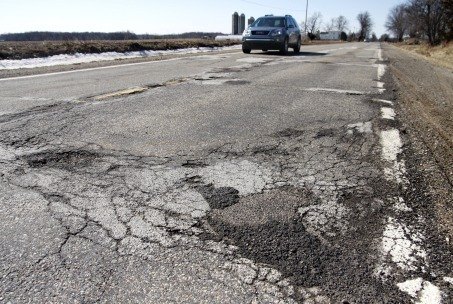Stimulus Funds Not Targeting Nation's Worst Roads
A major criteria for spending funds from the recent stimulus bill was that qualifying projects had to be “shovel ready.” Though that stricture was put in place to speed up the stimulus’s impact on the economy, it’s preventing the replacement of many of the worst roads in the nation. USA Today reports that only 20 percent of the $10 billion in stimulus money being spent on road repairs will go to the 74 counties that host half of the country’s worst roads. According to USA Today‘s analysis, those 74 (mostly-urban) counties will split $1.9 billion in stimulus road repair funds. Counties with no roads in need of major repairs mysteriously ended up with $1.5 billion. “Objective reviews show that Recovery Act dollars are going to the communities that need it the most to repair roads and bridges in need of help,” say Federal Highway Administration spokesfolks. However, USA Today‘s study is based on FHA data from 2007. USA Today has an interactive map comparing miles of “unacceptable” roads and amounts of stimulus dollars allocated. Check it out here.
More by Edward Niedermeyer


































Comments
Join the conversation
Anyway, fine, you want to talk highways instead of bridges? We'll go to the FHWA's 2006 Status of the Nation's Highways, Bridges, and Transit. From Chapter 3: System Conditions: Highways and Bridges:
In 2004, 44.2 percent of travel on arterials and collectors for which data are available occurred on pavements with "good" ride quality, up from 39.8 percent in 1995. The percentage of VMT on roads with "acceptable" ride quality (a lower standard that includes roads classified as "good") fell from 86.6 percent to 84.9 percent over the same period of time. You'll also find in Chapter 4 that according to the FTA bus age and condition has been relatively stable, and the condition of rail stations and rail maintenance facilities have improved slightly, and the average age of rail cars decreased slightly. Roads and bridges are being maintained. The key metric that's getting worse is congestion. (See other chapters in the report.) Possible solutions to that include congestion charges, building more roads, or spending on alternate means of travel. But the need to relieve congestion is different from "supporting infrastructure" and maintenance of "deteriorating infrastructure," which is what you and John Horner focused on.Roads are one of the few things government should be concerned exclusively with since traveling benefits us all. To move goods around the country is a requirement not easily met by rail, air or even boat. If really good roads were a priority for our tax dollars I, like most people, would have no problem paying the bill. But too many examples exist where taxes collected for roads were spent elsewhere. Millions of dollars in bridge tolls were diverted in Philadelphia for "development projects" including museums, housing, river dredging and huge salaries for the Port Authority chiefs. While the diverted causes were probably grand and great, they should be funded some other way instead of soaking motorists crossing a bridge over a natural barrier to get to work.